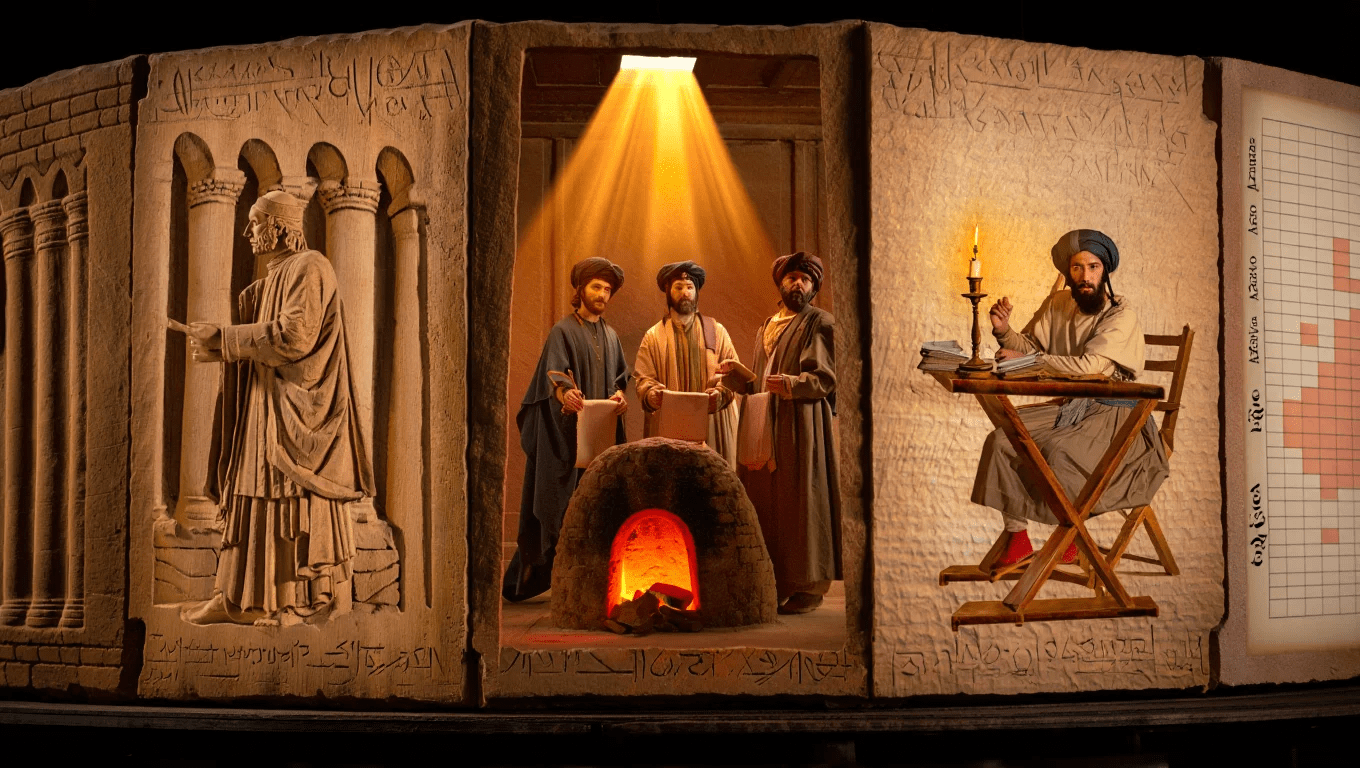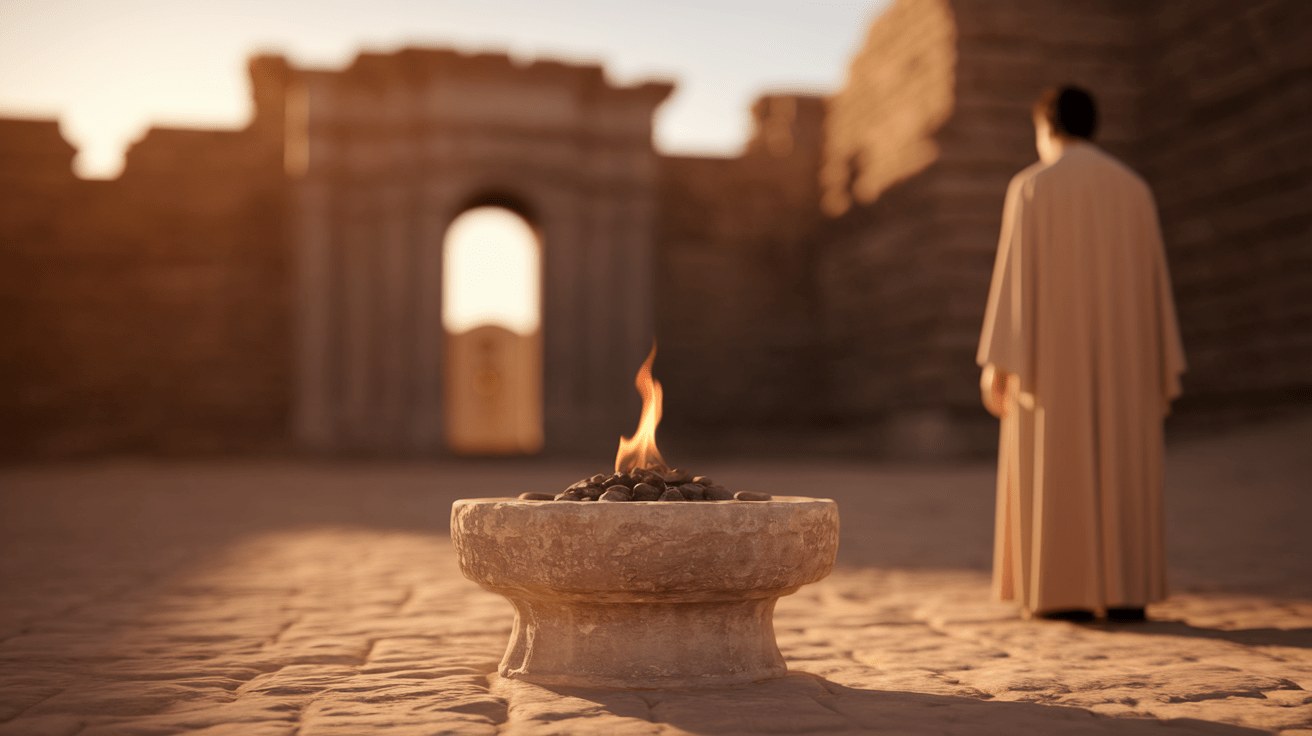
Have you ever wondered about the powerful story behind the name Azariah?
This striking biblical name doesn’t just sound beautiful—it carries centuries of profound meaning that continues to inspire parents today.
With its Hebrew roots meaning “helped by God” or “God has helped,” Azariah embodies divine protection in its very essence.
From ancient Jerusalem to modern nurseries, this name has traveled through time while maintaining its spiritual significance and distinctive character.
While Azariah faced the fiery furnace in the Book of Daniel, his Babylonian name, “Abednego,” actually means “servant of Nego”—a deliberate corruption of the name of the Babylonian god Nebo, altered by Jewish scribes to avoid honoring a pagan deity.
If you’re expecting a child, researching your own name, or are intrigued by the depth of biblical nomenclature.
Join us as we explore the remarkable expedition of Azariah—a name that bridges ancient wisdom and contemporary spirituality with timeless appeal.
Understanding the Meaning and Significance
Many Hebrew names carry deep spiritual and historical meaning.
One such name is derived from the root “azar” and the divine reference “Yah”, reflecting both linguistic structure and cultural devotion.
The table below breaks down its components and significance:
| CATEGORY | DETALS |
|---|---|
| Hebrew Roots | Derived from “azar” (עזר) meaning “to help” and “Yah” (יה), a shortened form of “Yahweh” |
| Literal Translation | “Helped by Yahweh” or “Yahweh has helped” |
| Linguistic Structure | A theophoric name combining a verb with the divine name |
| Historical Context | Emerged during the early first millennium BCE |
| Cultural Significance | Common in the Kingdom of Judah (c. 930–586 BCE) |
| Naming Practice | Reflected the Hebrew tradition of expressing religious devotion through names |
| Theological Meaning | Conveyed both gratitude for past divine help and confidence in continued divine support |
This name not only identifies its bearer but also serves as a powerful expression of faith, gratitude, and divine connection in ancient Hebrew culture. Its structure and usage offer a meaningful window into the theological and linguistic traditions of early Israelite society.
Azariah as a Baby Name Today

Azariah has gained significant popularity as a baby name in recent years, particularly since 2010.
While traditionally associated with males in biblical contexts, it’s increasingly chosen for girls, making it a versatile unisex option for modern parents.
The name is typically pronounced ah-zuh-RYE-uh, though regional variations exist. Parents choosing Azariah have several appealing nickname possibilities, including Aza, Zari, Riah, Ari, or Zar.
International variations, such as Azarias (Greek), Azario (Italian), and Azariya (Russian), offer additional options. Azariah pairs beautifully with other biblical names or those sharing similar sounds.
While its strong biblical heritage may carry some religious associations, its distinctive sound, combined with ancient roots, makes it appealing to contemporary parents seeking a unique yet meaningful name.
Azariah in Biblical References

The Bible mentions multiple significant figures named Azariah. Most prominently, Azariah served as high priest during King Uzziah’s reign in Judah (2 Chronicles 26).
When Uzziah improperly entered the temple to burn incense, Azariah boldly confronted him, defending sacred boundaries despite royal authority.
Another famous Azariah was one of Daniel’s three companions in Babylonian exile, better known by his Babylonian name Abednego (Daniel 1:6-7).
Alongside Shadrach and Meshach, he refused to worship King Nebuchadnezzar’s golden statue and survived the fiery furnace through divine intervention.
Other biblical Azariahs include a prophet during King Asa’s time who encouraged religious reforms (2 Chronicles 15:1-7), one of Solomon’s officials (1 Kings 4:2), and a companion of Ezra who helped explain the law to returning exiles (Nehemiah 8:7).
The recurring use of this name throughout scripture emphasizes the theme of divine assistance in various historical contexts.
Exploring the Cultural and Religious Meaning of Azariah

The name Azariah holds deep theological and spiritual significance across various religious traditions. Rooted in the Hebrew for “Helped by God,” it reflects both personal faith and cultural heritage.
Below is a concise look at how this name is understood and used in different contexts:
| Aspect | Summary |
|---|---|
| Theological Meaning | Symbolizes divine help, reflecting God’s care and active role in human life. |
| Judaism | Retains its original Hebrew significance and covenantal identity. |
| Christianity | Linked to Azariah/Abednego, a symbol of faith in adversity, especially in Orthodox traditions. |
| Islam | Identified with righteous figures like Azaryahu, though not in the Quran directly. |
| African Traditions | Used in faith practices blending Christianity and indigenous beliefs. |
| Modern Spiritual Use | Chosen for its universal theme of divine assistance across non-denominational contexts. |
Across faiths and cultures, Azariah serves as more than just a name—it’s a powerful declaration of trust in divine support, offering a bridge between ancient belief and modern spiritual identity.
Azariah Through History

The name Azariah spans over three millennia of recorded history, first appearing prominently in biblical texts around 850 BCE as a high priest during King Uzziah’s reign.
Its most famous bearer was arguably Azariah (Abednego), who survived Nebuchadnezzar’s furnace.
After flourishing in ancient Judea, the name persisted primarily within Jewish communities during the medieval period, with notable bearers including Rabbi Eleazar ben Azariah and Renaissance scholar Azariah dei Rossi.
Nearly forgotten in Western culture by the 19th century, Azariah experienced a remarkable revival post-2000, particularly in the United States.
The name appears in various forms across cultures: Azarias (Greek), Azario (Italian), Azariya (Russian), and عزريا (Arabic).
Modern Usage and Popularity

Azariah has experienced a remarkable surge in popularity since 2010, entering the US Top 1000 baby names in 2015 and continuing its steady climb.
While historically a male name, nearly 40% of new Azariahs are now female, reflecting its growing appeal as a unisex option.
The name shows strongest popularity in southern US states and evangelical Christian communities, though it’s gaining traction nationwide.
Notable contemporary bearers include television host Azariah Southworth, social media influencer Azariah Avin, and musician Azariah Koroma.
Pronunciation varies regionally, with Americans typically saying ah-zuh-RYE-ah, British speakers favoring az-uh-RIE-uh, and Spanish-influenced regions using ah-zah-REE-ah.
Alternative spellings include Azaria, Azarya, Azaryah, and Azariyah. The name particularly appeals to parents seeking options with spiritual significance and distinctive sound profiles.
Character Traits Associated with the Name Azariah

The name Azariah is often linked with traits that reflect its deep spiritual roots and historical significance. Here are some qualities commonly associated with it:
1. Resilience
People named Azariah often demonstrate exceptional inner strength and ability to recover from difficulties, reflecting the divine help suggested by the name’s meaning.
Their resilient nature enables them to face life’s challenges with remarkable grace and emerge stronger, inspiring those around them with their unwavering determination and positive outlook.
2. Supportiveness
Azariahs typically embody the “helper” aspect embedded in their name’s etymology, making them dependable allies and natural counselors to others.
Their innate empathy and willingness to extend a helping hand create a safe space for loved ones to seek guidance and comfort, establishing them as trusted pillars within their communities and relationships.
3. Spiritual Awareness
A grounded spirituality and a natural inclination toward faith in higher guidance often characterize individuals bearing this name.
They often find meaning in everyday moments, seeing patterns and connections that hint at a greater cosmic order beneath the surface of ordinary life.
4. Courage
The biblical connections suggest remarkable bravery and conviction, reminiscent of Azariah/Abednego, who remained steadfast despite facing mortal danger.
This inner strength enables them to stand firm in their principles even when facing opposition or walking a solitary path others fear to tread.
5. Balanced Wisdom
Azariahs often possess a harmonious personality—humble yet confident, thoughtful yet sociable—with wisdom that seems to transcend their years.
This rare equilibrium enables them to guide life’s complexities with ease, offering counsel that bridges practical reality with profound spiritual insights.
6. Leadership
Many associate the name with natural leadership qualities, particularly in guiding others through challenging circumstances with calm assurance.
Their leadership style tends to inspire rather than command, drawing out the best in others through authentic presence and a genuine belief in each person’s inherent potential.
Similar Biblical Names and Their Meanings

Many biblical names, such as Azariah, carry rich spiritual significance and reflect a profound connection to divine help, presence, or promise.
- Theophoric Comparisons: Names like Zechariah, Nehemiah, and Jeremiah share the “-iah” suffix, indicating a divine connection, as seen in Azariah (“helped by God”).
- Similar Meanings: Ezra, Samuel, and Joshua reflect themes of divine help and guidance.
- Thematic Links: Nathaniel, Elijah, and Jedediah also emphasize a close relationship with God.
- Sibling Name Ideas: Pair Azariah with Isaiah, Josiah, or Obadiah for boys; Mariah, Moriah, or Adaiah for girls; and Micah, Noah, or Shiloh for gender-neutral harmony.
The Spiritual Legacy of the Name Azariah

The biblical Azariahs offer profound spiritual lessons that remain relevant today. The high priest Azariah demonstrated moral courage by confronting King Uzziah, teaching us to uphold truth even against authority.
Meanwhile, Azariah/Abednego’s ordeal in the fiery furnace exemplifies unwavering faith amidst persecution.
The name’s meaning—”helped by God”—carries an enduring message that divine assistance remains available during our greatest challenges.
In contemporary spiritual life, Azariah reminds us that acknowledging our dependence on something greater than ourselves isn’t weakness but wisdom.
This ancient name continues to inspire a balanced spirituality that combines human effort with openness to divine guidance, offering a timeless template for navigating life’s complexities.
Parting Words
Azariah stands as a testament to the enduring power of names that connect us to ancient wisdom while remaining relevant to contemporary life.
Its rich biblical heritage, profound theological meaning, and beautiful phonetic quality combine to create a name that exceeds time and cultural boundaries.
The name’s core message—divine help in times of need—resonates deeply in our often uncertain world.
As parents continue to seek names that offer both meaning and distinction, Azariah provides the perfect blend of spiritual significance and modern appeal.
Whether chosen for religious reasons or simply for its melodic sound, Azariah carries with it a legacy of courage, faith, and resilience.
In a world that increasingly values genuine connection to tradition alongside individuality, Azariah beautifully bridges past and present, offering its bearers a name that is both anchored in history and perfectly suited to today.
For further name suggestions, feel free to Click Here and take a look at our other thoughtfully written naming blogs.

